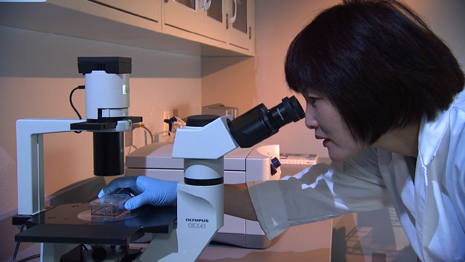FAYETTEVILLE, Ark. – Sha Jin, assistant professor of biomedical engineering at the University of Arkansas, will present a lecture, “The Value of HeLa Cells for Biomedical Research,” at 7 p.m. Thursday, Oct. 14 in the Arkansas Union Theatre. The lecture is free and open to the public.
Jin uses HeLa cells in her lab at the university’s Engineering Research Center to develop a molecular “probe” that can detect an enzyme produced when cells are infected with HIV, the virus that causes AIDS, and also can determine the toxicity levels of drugs used to treat HIV.
HeLa cells are ideal for Sha Jin’s research for several reasons: they grow rapidly; can be handled in a straightforward manner; grow in large quantity; and are less costly to grow than many other cell cultures. In addition, targeted genes can be easily delivered to HeLa cells.
HeLa cells are derived from cervical cancer cells that were taken from Henrietta Lacks, who died from her disease in 1951. Her story, the medical breakthroughs made possible by researchers using HeLa cells, and the issues raised by their use are the subject of The Immortal Life of Henrietta Lacks, by Rebecca Skloot. The book is being read this year in the university’s One Book, One Community project. Sha Jin’s lecture is part of the communitywide discussion of the book this fall.
An eight-minute film about Sha Jin’s research, HeLa: Probing for a Cure, will be shown as part of her lecture. The film was produced by university relations. Robert Haslam, director of the Quality Writing Center at the University of Arkansas will introduce both Sha Jin and the film.
Topics
Contacts
Steve Voorhies, manager of media relations
University Relations
479-575-3583,
voorhies@uark.edu
